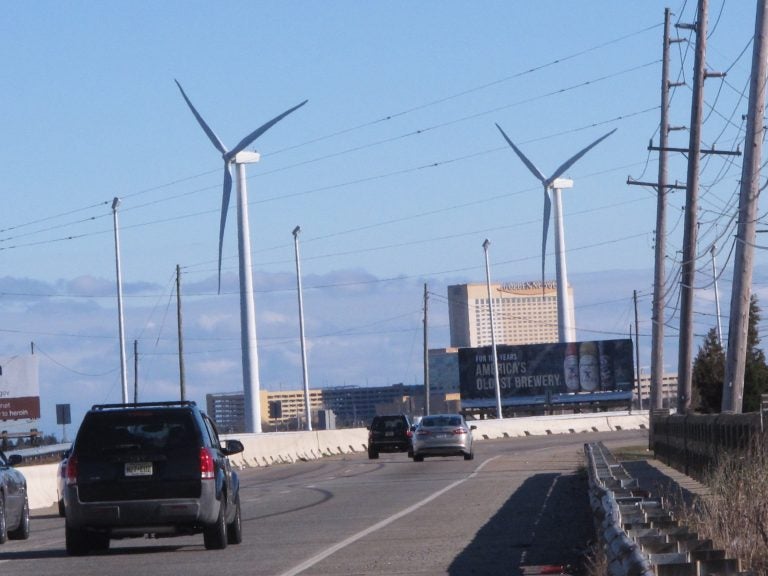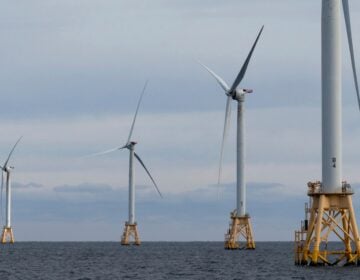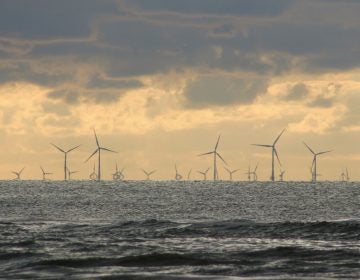Despite favorable political winds, scant progress in N.J. on climate change
Environmental advocates weigh in on why pollution-control efforts in the Garden State have lagged, and on prospects for reaching the state’s goal on carbon emissions.

Cars drive past windmills on the grounds of a sewage treatment plant in Atlantic City, N.J. on Monday Jan. 4, 2016. (Wayne Parry/AP Photo)
This story originally appeared on NJ Spotlight.
—
With an aggressive clean-energy agenda and an administration committed to fighting climate change, New Jersey seemingly is well-positioned to achieve significant reductions in global-warming pollutants.
In the 12 years since the state mandated that greenhouse-gas emissions be reduced by 80 percent by mid-century below 2006 levels, policymakers have identified a range of policies to put New Jersey on target to reach that goal.
Unfortunately, there’s been more talk than action in making those policies happen, advocates on climate change say.
“The good news is we have a sympathetic administration that wants to do the right thing and undo the mistakes of the last eight years,’’ said Michael Catania, executive director of Duke Farms and a former deputy commissioner of the state Department of Environmental Protection. “The bad news is we’re running out of time. It’s time to put a plan into action.’’
Others said virtually all of the actions the state needs to take to see meaningful drops in carbon pollution are essentially stalled right now, including ones that could achieve the biggest reductions in emissions that accelerate global warming.
Setbacks on reducing emissions
In offshore wind, a clean-power source ignored for years by the Christie administration, it’s just now beginning to look like turbines will be turning off the Jersey Shore by the middle of the next decade. But the outlook for growth in the solar market is more unsettled with uncertainty over how the state will incentivize future installations.
“Offshore wind is going to be kind of late to the parade, and solar is not going to get us there by itself,’’ conceded Lyle Rawlings, a solar developer instrumental in formulating policies that have led to phenomenal growth in the sector.
Perhaps the biggest impasse, however, involves reducing pollution from the transportation sector, the biggest source of greenhouse-gas emissions. A bill (S-2252) to promote electric vehicles is mired in the Legislature; the Trump administration is rolling back federal fuel-economy standards; and Washington is also threatening to kill a waiver allowing California, New Jersey and a dozen other states to mandate cleaner cars be sold within their jurisdictions.
The setbacks have drawn notice from New Jersey lawmakers. On Monday, the Senate approved a bill (S-3207) that aims to ensure the state is on target to meet the goals of its original 2007 Global Warming Response Act. It would require the DEP to monitor and report greenhouse gas emissions, and within a year recommend additional measures to curb pollution to achieve the 2050 goal laid out in the act.
But some say the bill falls short. “This bill is a smoke screen when it comes to dealing with carbon dioxide emissions,’’ said Jeff Tittel, director of the New Jersey Sierra Club. “It does nothing to reduce greenhouse gas emissions.’’
Other environmental advocates were more optimistic. “This is much needed legislation to ensure the state takes meaningful steps to reduce emissions,’’ said Tom Gilbert, campaign director of Rethink Energy NJ.
He cited provisions requiring the DEP to set benchmarks between now and 2050 for curbing carbon pollution and requiring actions to reduce emissions to achieve the targets if monitoring shows the state will fall short.
Advocates: A change in focus is needed
After the original bill was passed in 2007, the DEP identified three key strategies to achieve the required reductions — the state’s Energy Master Plan, the clean-car program pushed by California, and the Regional Greenhouse Gas Initiative, a multi-state program to reduce emissions from power plants.
The Christie administration’s EMP, the one now in effect, focused on expanding the state’s natural-gas infrastructure, a policy still embodied in the number of proposed new gas-pipeline expansions and new gas-fired power plants still under consideration.
“The problem is the first pillar of the last EMP was natural gas expansion, which is not going to get us there,’’ said Rawling, referring to the need to curb fossil-fuel emissions, not to increase them. Most of the state’s environmental groups agree, calling for a moratorium on new natural gas projects, a request so far ignored by the Murphy administration.
The Murphy administration is pushing New Jersey to rejoin RGGI, which the Christie administration pulled out of in 2011. The state, however, is not expected to rejoin the program until next year, according to the DEP. “Certainly, we have missed time and opportunity over the last eight years,’’ Gilbert said.
Doug O’Malley, director of Environment New Jersey, argued the state will only hit the 2050 target if it rejects expansion of any fossil-fuel infrastructure in the state; moves quickly to electrify the transportation sector; and develops the offshore wind industry.
“The decisions we make in the next five years are going to be crucial,’’ he said.
WHYY is your source for fact-based, in-depth journalism and information. As a nonprofit organization, we rely on financial support from readers like you. Please give today.




